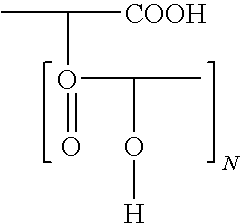Emulsifier for highly liquid W/O emulsion based on partly crosslinked polyglycerol esters of polyhydroxystearic acid
a polyhydroxystearic acid and emulsifier technology, applied in the direction of chemical/physical processes, chemical modification of fatty acids, drug compositions, etc., can solve the problems of difficult stabilization of water-in-oil emulsions, heavy and tacky feeling, and the type of emulsifier is not suitable for stabilizing flowable emulsions (lotions) and creams, etc., to achieve the effect of energy saving
- Summary
- Abstract
- Description
- Claims
- Application Information
AI Technical Summary
Benefits of technology
Problems solved by technology
Method used
Image
Examples
example 1
[0063]In the first stage, polyglycerol (hydroxyl number (OHN)=1,090) was esterified with fatty acid 88.4 g (0.31 mol) of isostearic acid and 157.5 g (0.13 mol) of polyhydroxystearic acid having an acid number (AN) of 47 were esterified with 100 g of polyglycerol in the first stage at 240° C. and while passing nitrogen through. After a reaction time of 2 hours at this temperature, the acid number was <10. In the second stage, the mixture was cooled to 130° C. and 22.5 g (0.11 mol) of sebacic acid were added The mixture was heated again to 240° C. and stirred at this temperature for 3 hours. A viscous product having an acid number of <5 was obtained
example 2
[0064]91.1 g (0.32 mol) of isostearic acid and 141.7 g (0.12 mol) of polyhydroxystearic acid having an acid number (AN) of 47 were esterified with 61.9 g of polyglycerol (OHN=950) at 240° C. and while passing nitrogen through After a reaction time of 2 hours at this temperature, the acid number was <10. In the second stage, the mixture was cooled to 130° C. and 20.2 g (0.1 mol) of sebacic acid were added. The mixture was heated again to 240° C. and stirred at this temperature for 3 hours. A viscous product having an acid number of <5 was obtained
example 3
[0065]120.0 g (0.42 mol) of isostearic acid and 75.0 g (0.17 mol) of polyhydroxystearic acid having an acid number (AN) of 47 were esterified with 75.0 g of polyglycerol (OHN=950) at 240° C. and while passing nitrogen through. After a reaction time of 2 hours at this temperature, the acid number was <10. In the second stage, the mixture was cooled to 130° C. and 20.2 g (0.1 mol) of sebacic acid were added The mixture was heated again to 240° C. and stirred at this temperature for 3 hours. A viscous product having an acid number of <5 was obtained
PUM
| Property | Measurement | Unit |
|---|---|---|
| temperatures | aaaaa | aaaaa |
| temperatures | aaaaa | aaaaa |
| solidification points | aaaaa | aaaaa |
Abstract
Description
Claims
Application Information
 Login to View More
Login to View More - R&D
- Intellectual Property
- Life Sciences
- Materials
- Tech Scout
- Unparalleled Data Quality
- Higher Quality Content
- 60% Fewer Hallucinations
Browse by: Latest US Patents, China's latest patents, Technical Efficacy Thesaurus, Application Domain, Technology Topic, Popular Technical Reports.
© 2025 PatSnap. All rights reserved.Legal|Privacy policy|Modern Slavery Act Transparency Statement|Sitemap|About US| Contact US: help@patsnap.com


